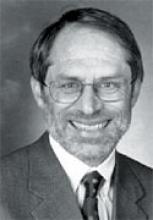User login
“We decided we better leave when the roof caved in.”
“When we left the base, armed hijackers were waiting outside.”
“When we returned, our whole block was gone.”
I am sure many of you, like me, have friends and family affected by Hurricane Katrina. Perhaps you have heard similar personal accounts of the disaster, anguished over loved ones, or commiserated with those whose lives have been irrevocably changed. For those of us living many miles from Katrina’s path, we have gawked at the video and balked at the gas prices. Many of you, I am sure, have helped as you feel best able.
Fortunately, my relatives, and friends, and friends of friends, are predominately wealthy, mobile, professional, and able to endure such disasters, however momentous. They checked into hotels, drove or flew away, fled the maelstrom enveloping the city, and are busy filing insurance claims.
But those who suffered the most crushing blows of all—the faces I saw on television, in the newspapers, at the Superdome, stranded on roofs and on islands of terra firma—those individuals were predominately the poor, the infirm, and the underclass. Nowhere more visible a portrayal of classes divided, of racial disparities, of the worse of our socioeconomic chasms was this disaster, a case that was—how can one say this in a politically correct way—black and white.
I am dismayed by the lack of emergency preparedness in NOLA. I am galled by our federal government’s lackadaisical response. I remain flabbergasted by the nation’s inattention to public health, emergency preparedness, and disaster planning. While we worry about threats to overseas oil, spend billions on war and curricula on bioterrorism, and go on wild goose chases for imaginary weapons, it is business as usual back home. I guess I should hardly be surprised.
The price of being poor and black in America has never been clearer.
“We decided we better leave when the roof caved in.”
“When we left the base, armed hijackers were waiting outside.”
“When we returned, our whole block was gone.”
I am sure many of you, like me, have friends and family affected by Hurricane Katrina. Perhaps you have heard similar personal accounts of the disaster, anguished over loved ones, or commiserated with those whose lives have been irrevocably changed. For those of us living many miles from Katrina’s path, we have gawked at the video and balked at the gas prices. Many of you, I am sure, have helped as you feel best able.
Fortunately, my relatives, and friends, and friends of friends, are predominately wealthy, mobile, professional, and able to endure such disasters, however momentous. They checked into hotels, drove or flew away, fled the maelstrom enveloping the city, and are busy filing insurance claims.
But those who suffered the most crushing blows of all—the faces I saw on television, in the newspapers, at the Superdome, stranded on roofs and on islands of terra firma—those individuals were predominately the poor, the infirm, and the underclass. Nowhere more visible a portrayal of classes divided, of racial disparities, of the worse of our socioeconomic chasms was this disaster, a case that was—how can one say this in a politically correct way—black and white.
I am dismayed by the lack of emergency preparedness in NOLA. I am galled by our federal government’s lackadaisical response. I remain flabbergasted by the nation’s inattention to public health, emergency preparedness, and disaster planning. While we worry about threats to overseas oil, spend billions on war and curricula on bioterrorism, and go on wild goose chases for imaginary weapons, it is business as usual back home. I guess I should hardly be surprised.
The price of being poor and black in America has never been clearer.
“We decided we better leave when the roof caved in.”
“When we left the base, armed hijackers were waiting outside.”
“When we returned, our whole block was gone.”
I am sure many of you, like me, have friends and family affected by Hurricane Katrina. Perhaps you have heard similar personal accounts of the disaster, anguished over loved ones, or commiserated with those whose lives have been irrevocably changed. For those of us living many miles from Katrina’s path, we have gawked at the video and balked at the gas prices. Many of you, I am sure, have helped as you feel best able.
Fortunately, my relatives, and friends, and friends of friends, are predominately wealthy, mobile, professional, and able to endure such disasters, however momentous. They checked into hotels, drove or flew away, fled the maelstrom enveloping the city, and are busy filing insurance claims.
But those who suffered the most crushing blows of all—the faces I saw on television, in the newspapers, at the Superdome, stranded on roofs and on islands of terra firma—those individuals were predominately the poor, the infirm, and the underclass. Nowhere more visible a portrayal of classes divided, of racial disparities, of the worse of our socioeconomic chasms was this disaster, a case that was—how can one say this in a politically correct way—black and white.
I am dismayed by the lack of emergency preparedness in NOLA. I am galled by our federal government’s lackadaisical response. I remain flabbergasted by the nation’s inattention to public health, emergency preparedness, and disaster planning. While we worry about threats to overseas oil, spend billions on war and curricula on bioterrorism, and go on wild goose chases for imaginary weapons, it is business as usual back home. I guess I should hardly be surprised.
The price of being poor and black in America has never been clearer.
